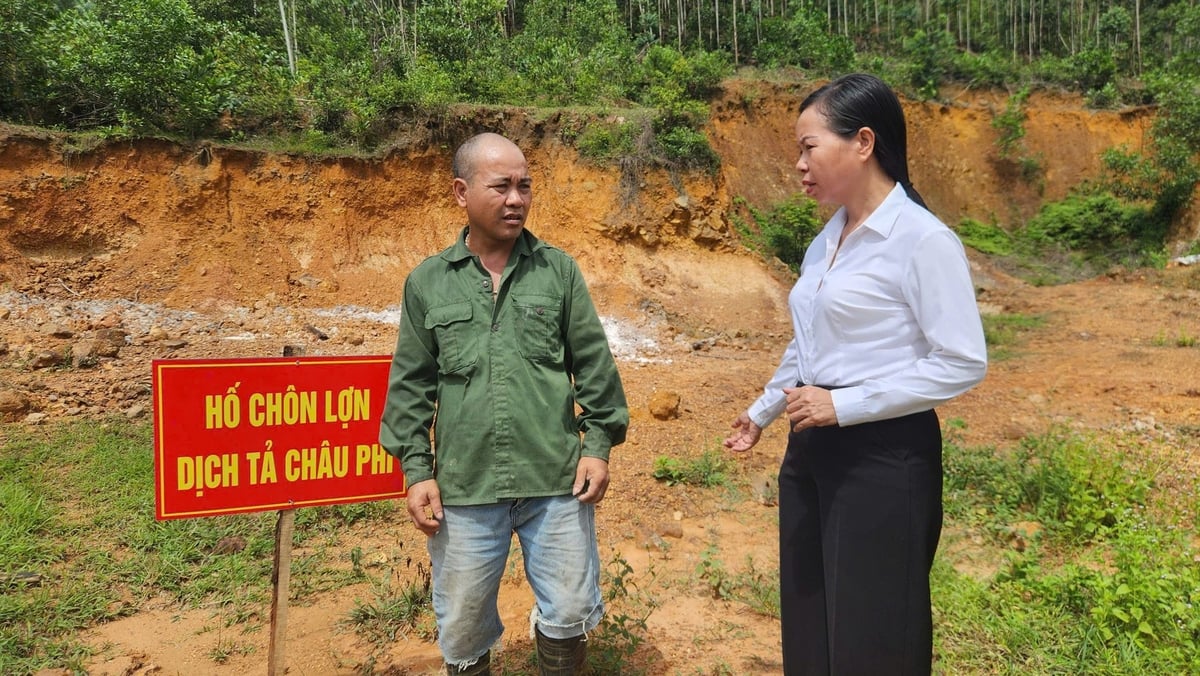December 7, 2025 | 23:52 GMT +7
December 7, 2025 | 23:52 GMT +7
Hotline: 0913.378.918
December 7, 2025 | 23:52 GMT +7
Hotline: 0913.378.918
The African swine fever (ASF) situation is complicated and causing severe damage in Binh Khe ward, Quang Ninh province. As of August 1, 2025, 18 households in 15 of 24 neighborhoods were affected by ASF outbreaks, destroying a total of 315 pigs, equivalent to more than 13.5 tons of meat lost. African swine fever not only directly affects the livelihoods of farmers but also poses great challenges in disease control at the grassroots level.

African swine fever occurred in 18 households in Binh Khe ward, leading to the death of 315 pigs. Photo: Nguyen Thanh.
In the last two weeks of July, the disease spread at an alarming rate, covering all key livestock farming areas in the area. Although there are currently 9 areas where the disease has not yet occurred, the risk of an outbreak still exists if timely and effective control measures are not taken.
“My family raises 153 pigs on an area of 400 m2. African swine fever killed 86 pigs, with a total loss of 4 tons. I have been raising pigs for more than 10 years, and I have never seen so many deaths. When I discovered that the pigs were sick, I quickly reported to the local authorities so they could handle the situation by taking samples for testing and destroying the dead ones. The pigs that were not sick were isolated, and strangers were not allowed in the barn to ensure safety,” said Nguyen Van Duc, a farmer in the Linh Trang area, Binh Khe ward.
According to Nguyen Ngoc Hung, Vice Chairman of Binh Khe Ward People's Committee, as soon as the first outbreak was detected, the People's Committee quickly activated prevention plans. The Steering Committee for the Prevention of Livestock and Poultry Diseases was strengthened, and directive documents were urgently issued, including the decision to declare the epidemic, the plan to destroy sick pigs and instructions on environmental treatment.
Binh Khe ward has particularly issued 36 decisions, 6 notices and 3 official dispatches in less than 15 days to control the disease situation. The necessary steps for epidemic declaration and destruction of sick pigs are carried out immediately after the veterinary force confirms the positive test results.
However, administrative measures, if not accompanied by the synchronous participation of the people, will hardly bring about thorough results. Some households raise livestock on a small scale, with makeshift barns scattered in residential areas, so it is difficult for the veterinary force to perform screening, monitoring and outbreak handling.
One of the major bottlenecks is the lack of veterinary staff in the ward, which cannot meet the actual needs when the epidemic breaks out. Currently, only two officers are assigned to be in charge of the entire area, while the requirements for monitoring, sampling, supporting destruction and information dissemination are very high. Transporting test samples is also proven to be very difficult because they must be sent to the Central Veterinary Diagnosis and Testing Center I in Hai Phong, hence slower response to disease outbreaks.

Local officials propagate and instruct farmers on how to prevent the epidemic. Photo: Nguyen Thanh.
Facing this situation, the People's Committee of Binh Khe Ward has implemented synchronous measures. An epidemic prevention team is established to directly guide and supervise the destruction process to ensure proper procedures and zero environmental pollution.
Disinfection and sterilization work is carried out regularly and continuously, with 700 liters of medicine distributed by the Quang Ninh Sub-Department of Livestock Production and Animal Health. Neighborhoods are required to actively propagate and mobilize people to proactively clean their barns and not hide the signs of the epidemic. Local livestock farmers should also be fully equipped with knowledge and skills to prevent epidemics.
In addition to disease prevention work, Binh Khe Ward People's Committee takes the initiative to support domestic consumption of healthy pigs from households. Consumers are encouraged to continue using safe pork, avoiding boycott psychology, thereby stabilizing the market and reducing pressure on farmers.
Chu Thi Thu Thuy, Head of Quang Ninh Sub-Department of Livestock Production and Animal Health, emphasized that re-planning livestock farming areas and gradually reducing small-scale farming density in residential areas are of great urgency. “If the current fragmented and uncontrolled small-scale farming models continue to be maintained, the risk of disease recurrence and spread is very high, not only in Binh Khe but also in many other localities in the province,” she said.
Translated by Samuel Pham

(VAN) After three years, Project FST/2020/123 collected approximately 3,000 insect specimens, classified them into about 50 morphological groups, and identified around 40 species, including several new species.
/2025/12/01/0509-2-175427_206.jpg)
(VAN) Emission-reducing coffee areas in Lam Dong have entered the new crop with stable yields, improved quality, and a remarkably enhanced cultivation environment.

(VAN) The Institute of Agricultural Sciences for Southern Vietnam (IAS) marked its 100th anniversary in Ho Chi Minh City, celebrating a century of growth as a leading institute contributing significantly to Viet Nam’s agricultural development.

(VAN) An increasing number of livestock farms are using biogas generators to create a source of renewable electricity, helping to save costs and mitigate environmental pollution.

(VAN) Small changes in rice cultivation, from irrigation methods and straw collection to input management, are paving a new way for Vietnam's agriculture in the journey toward emission reduction.

(VAN) With the project of converting biogas into renewable electricity, Australia is both helping pig farms reduce their energy costs by up to 25% and contributing to environmental protection.
![Hue aims for Net Zero: [1] Initial steps from green transportation](https://t.ex-cdn.com/nongnghiepmoitruong.vn/608w/files/huytd/2025/11/28/0853-anh-6-giao-thong-xanh-hue-094717_940-153724.jpg)
(VAN) For sustainable development, Hue City is implementing many solutions to promote green transportation, which is an important initial step on the journey to building a Net Zero Hue.